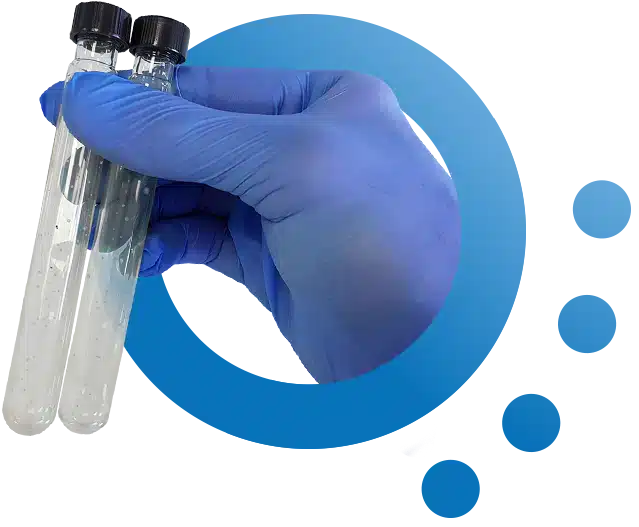Research
A full range of R&D services
OUR RESEARCH EXPERTISE
OUR RESEARCH EXPERTISE
We have developed a wide line of tests, ranging from in vitro analyses to field trials assessing the effects of dietary interventions on large populations of animals.
Thanks to trials run under controlled conditions, it is possible to study the biological mechanisms of treatments and products that impact health, behavior, or performance, and in particular, the digestive microbiota.
Key laboratory analyses strictly adhere to reference methods in microbiology, biochemistry, parasitology, etc.

Range of tests
- Dose effect
- Kinetics
- Efficiency:
- Palatability / preference test
- Digestibility studies
- Performance evaluation test
- Behavior analyses
Parameters
- Digestive microbiota function and activity
- Metabolite concentrations
- Inflammation markers / Histology
- Culture and enumeration of parasites
- Feed efficiency
- Cardio-respiratory monitoring
- Imaging
OUR RESEARCH RESOURCES
RESEARCH EQUIPMENT AND FACILITIES
- Animal facilities that allow for controlled studies
- Extensive range of equipment to monitor animal health, behavior, and performance
- Fully equipped laboratories for sample analysis
QUALIFIED AND COMMITTED TEAM
- Researchers internationally recognized in their fields of expertise
- Specialized technical staff to ensure projects are efficiently completed
- A team committed to all stages of the projects
PRODUCTIVE PARTNERSHIPS
- Strong collaborations with private and institutional teams
- Access to complementary areas of expertise
- A vast network of partners to build solid projects
START-TO-FINISH SUPPORT
START-TO-FINISH SUPPORT
We are involved in all stages of our clients’ R&D projects in animal nutrition and health, from support during the determination of the research objectives to results and data validation.
Lab To Field is a member of several competitiveness clusters (Hippolia, Vitagora, IAR), which facilitates the development and financing of innovative projects.
Based on our clients’ needs, trials can be designed to meet the regulatory requirements of different reference institutions (EFSA, FDA, etc.) and can be promoted through communications in congress or scientific publications.
Client request
Consulting
To help with decision making before product testing
Development phase
Project management
To ensure compliance with the client's objectives, budget and protocols defined for the R&D phase
LITERATURE REVIEW
To summarize data from the scientific literature
Positioning
To guide product development with a scientific and strategic approach
Formulation
To adapt feed composition/process to the physiology of each species
Framing
To determine the goals, overall budget, and milestones
Protocol definition
To detail tasks, costs, schedules, and responsibilities
Protocol realization
To collect data from the trials
Statistical analysis
To analyze data from the trials
Report
To summarize and interpret the results obtained
Data valuation
To present the results at congresses or in scientific publications if possible
START-TO-FINISH SUPPORT
Client request
We are involved in all stages of our clients’ R&D projects in animal nutrition and health, from support during the determination of the research objectives to results and data validation.
Lab To Field is a member of several competitiveness clusters (Hippolia, Vitagora, IAR), which facilitates the development and financing of innovative projects.
Based on our clients’ needs, trials can be designed to meet the regulatory requirements of different reference institutions (EFSA, FDA, etc.) and can be promoted through communications in congress or scientific publications.
Consulting
To help with decision making before product testing
Development phase
Project management
To ensure compliance with the client's objectives, budget and protocols defined for the R&D phase
LITERATURE REVIEW
To summarize data from the scientific literature
Positioning
To guide product development with a scientific and strategic approach
Formulation
To adapt feed composition/process to the physiology of each species
Framing
To determine the goals, overall budget, and milestones
Protocol definition
To detail tasks, costs, schedules, and responsibilities
Protocol realization
To collect data from the trials
Statistical analysis
To analyze data from the trials
Report
To summarize and interpret the results obtained
Data valuation
To present the results at congresses or in scientific publications if possible
OUR LATEST SCIENTIFIC COMMUNICATIONS
OUR LATEST
SCIENTIFIC COMMUNICATIONS

Fibrolytic function of the horse fecal microbiome: elderly versus adult healthy individuals.
Baraille et al. (Poster)

Baraille et al. (Conference)
Effect on the equine gastric ecosystem of partial barley replacement with high-fiber raw materials.
Julliand et al. (Conference)
Comparing the anthelminthic effect of different dehydrated sainfoin pellets in vitro.
Laroche et al. (Conference)

Vasseur et al. (Conference)

Halgrain et al. (Conference)

Vasseur et al. (Conference)
Heart rate variability as a predictor of racing performances in standardbred horses.
Vasseur et al. (Poster)
Disrupting hindgut microbiota through the diet alters strongyles infections in horses.
Laroche et al. (Conference)
Measuring biomarkers to assess the effect of diet on the mucosal integreity of the equine large intestine.
Laroche et al. (Poster)

Resilience of faecal microbiome after a drug stress in adult and senior equids.
Baraille et al. (Poster)
Omphalius et al. (Conference)
Relationship between hay botanical diversity and fecal bacterial diversity in horses.
Omphalius et al. (Conference)
Osteopathic manipulative treatment: a complementary approach to promote milk production in cows.
Omphalius et al. (Poster)
Effect of black soldier fly larvae oil on performance and health of lactating sows and piglets.
Omphalius et al. (Conference)

Omphalius et al. (Poster)

Omphalius et al. (Poster)

Grimm et al. (Conference)
Partial substitution of cereal with sugar beet pulp is beneficial for the hindgut microbiota.
Grimm et al. (Conference)
Replacing half of high-starch concentrates with alfalfa favourable modulates intestinal fecal ecosystem in exercised trotters.
Buttet et al. (Conference)
Diet might alter large intestine parasitism in horses.
Laroche et al. (Conference)
In vitro evaluation of a spirulina-derived product on the modulation of hindgut microbial ecosystem fermentation and immune response in horse.
Grimm et al. (Poster)
Relations between hindgut microbiota fibrolytic efficiency and physical performance in equine athletes.
Vasseur et al. (Conference)

